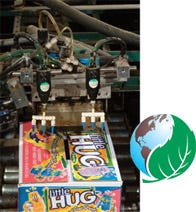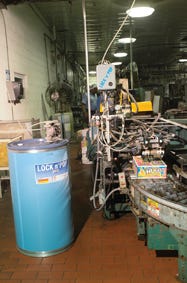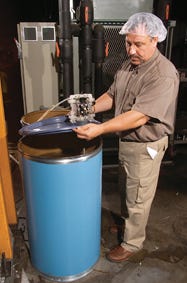Earth-friendly adhesive unitizes cases cleanly
January 30, 2014

Easy-release adhesive is sprayed from nozzles onto the cases of juice at Daily's Verona, PA, facility.
For Daily's Juice, a division of American Beverage Corp. located in Verona, PA, improved case appearance and safety were the primary motivators behind the company's switch from nine hot-melt case-sealing systems to new air-powered adhesive-spraying systems from Key Tech Corp./Lock n' Pop (www.locknpop.com), but the change netted some unexpected environmental benefits and cost savings as well.
Established in 1960 as Daily Juice Products, Daily's began as a small, door-to-door juice company that delivered fresh juice to local patrons on a daily basis—hence the name Daily's. Today, the company is a multimillion-dollar division of ABC, the third-largest manufacturer of noncarbonated fruit drinks in the U.S. Among Daily's flagship products are its Little HUG(R), Teeni, Sundew and Big Burst lines of fruit drinks and Daily's Fruit Mixers, distributed nationally to grocery and liquor stores. Since 1985, the company has sold more than 8 billion HUGS, which Daily's says represents more bottles of kids' drinks than have been sold by any other company.
By switching from cases stabilized with cornerboards to Lock n' Pop's unitizing agent, COSTCO saves on material costs and labor, while also reducing solid waste. Read about it at: www.packagingdigest.com/ info/costco0407
Daily's ships 2.5 million bottles of juice drinks and cocktail mixers a day from its 155,000-sq-ft facility in Verona. Nine of the company's 15 packaging lines run 24 hours a day, seven days a week. Three lines run cocktail mixers and juice concentrates in 12-oz, 1- and 1.75-L and 0.5- and 1-gal bottles. Single-serve juice drinks are packaged in 8- and 16-oz high-density polyethylene bottles.
Because products are shipped coast-to-coast, with multiple handlings through grocery and liquor distribution, Daily's must unitize loads to minimize damage, but found that stretch wrap alone could not handle the abuse. Thus, hot-melt-sealing systems were used to secure cases together before palletizing. However, this resulted in cases becoming hot-melt-scarred, as well as in frequent burn injuries to plant personnel due to the hot-melt equipments' melting systems.

An air-driven pump connected to a drum of adhesive supplies the nozzles with the adhesive, which is used to unitize pallet loads before stretch wrapping.
Little HUG and other juice drinks are packaged in graphics-intense, multicolor cases that hold 24 to 48 8-oz bottles. With a target audience of moms, kids and teenagers, case graphics in grocery distribution are an important component of point-of-purchase presentation. In the case of Daily's cocktail mixers, valued at $25 to $30 per case, the products are often displayed in liquor stores, so they also require attractive case graphics to drive sales. With Daily's hot-melt-sealing systems, the case graphics often became scarred when the cases were pulled apart upon depalletizing, which did not encourage purchase.
In an effort to minimize the damage to case graphics and to prevent in-plant injuries, Daily replaced its hot-melt systems with air-powered spraying systems supplied by Key Tech Corp./Lock n' Pop. These systems apply Lock n' Pop(R) adhesive, a low-tack, high-shear adhesive that keeps surfaces from abrading yet separates easily with essentially no visible residue.
Lock n' Pop is an environmentally conscious choice as well. Derived from renewable plant resources, Lock n' Pop products are water-based, biodegradable, nonflammable, nontoxic, repulpable and recyclable. According to Lock n' Pop, the amount of solid material required to stabilize a pallet load with the adhesive is "substantially less" than with conventional unitizing methods, and there is no waste to dispose of, as the material itself is recycled in the package recycling/repulping process.

Refilling the adhesive merely involves moving a small, air-powered pump from one drum to another every two to four weeks, says Daily's.
At Daily's, Lock n' Pop is now applied to the cases before they enter one of nine palletizers, fed by 13 bottling lines. The first three layers of cases, weighing from 15 to 30 lb, are each column-stacked, and the top six layers are interlocked. Lock n' Pop's initial tack is sufficient to hold pallet integrity as the loads move to the stretch wrapper and onto trucks that then move them to a warehouse nine miles away.
While Daily's still must use stretch wrap to stabilize pallet loads, some applications using Lock n' Pop do not require additional packaging. The chart at the top of this page shows the environmental benefits that Lock n' Pop says can be realized with its adhesive system.
According to Ken Janowitz, Daily's director of operations, there has been no apparent change in load integrity since the hot-melt systems were replaced. And, he says, unlike the maintenance required for hot melt, the only maintenance necessary for the cold-glue adhesive systems are a weekly cleaning of the nozzles with water and a wiping of the photoeyes. "Refilling the adhesive merely involves moving a small, air-powered pump from one drum to another every two to four weeks, and nobody gets burned," he adds.
"The replacement of hot melt has been a win-win-win situation," Janowitz continues. "The $60,000 investment in equipment [for all nine lines] paid for itself in eight months, with reduced adhesive cost and improved operations. Safety has been improved, and our graphics have never looked better."

More information is available:
Key Tech Corp./Lock n' Pop, 800/225-3009. www.locknpop.com.
You May Also Like


